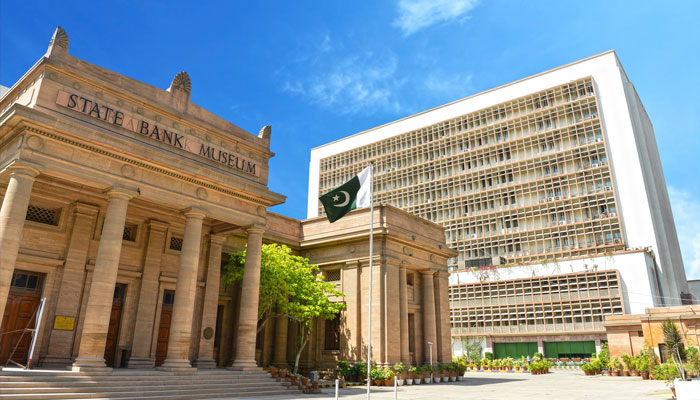SBP forex reserves rise to $9.4bn
KARACHI: Pakistan’s foreign exchange reserves held by the central bank increased by $19 million to $9.42 billion in the week ending July 12, the State Bank of Pakistan reported on Thursday.
The country’s total foreign exchange reserves rose by $59 million to $14.704 billion. The reserves of commercial banks increased by $40 million to $5.280 billion. Last week, Pakistan achieved a breakthrough by signing a new 37-month $7 billion Extended Fund Facility (EFF) with the International Monetary Fund (IMF). This significant achievement comes after the stabilization measures taken by the government along with the successful conclusion of the last standby arrangement (SBA) of $3 billion back in April this year. The deal is now subject to approval by the IMF Executive Board.
According to the latest Moody’s report, the new IMF programme will improve Pakistan’s (Caa3 stable) funding prospects. “The programme will provide credible sources of financing from the IMF and catalyze funding from other bilateral and multilateral partners to meet Pakistan’s external financing needs,” it said.
“However, the government’s ability to sustain reform implementation will be key to allowing Pakistan to continually unlock financing over the duration of the IMF programme, leading to a durable easing of government liquidity risks,” it added.
The rating agency, citing the IMF report, which was published in May said Pakistan’s external financing needs is about $21 billion for fiscal 2025 (ending June 2025) and about $23 billion for fiscal 2026-27. Pakistan’s foreign exchange reserves of $9.4 billion as of July 5 is well below its needs, it said.Pakistan’s external position remains fragile, with high external financing requirements over the next three to five years. The country is vulnerable to policy slippages. Weak governance and high social tensions can compound the government’s ability to advance reforms, jeopardizing its ability to complete reviews under the IMF programme and unlock external financing, it noted.
-
 Marc Anthony On Why Bad Bunny’s Super Bowl Show Mattered
Marc Anthony On Why Bad Bunny’s Super Bowl Show Mattered -
 Kid Rock Gets Honest About Bad Bunny’s Performance At Super Bowl
Kid Rock Gets Honest About Bad Bunny’s Performance At Super Bowl -
 Kylie Jenner Reveals Real Story Behind Her 'The Moment' Casting
Kylie Jenner Reveals Real Story Behind Her 'The Moment' Casting -
 Halsey Marks Fiancé Avan Jogia's Birthday With Emotional Note
Halsey Marks Fiancé Avan Jogia's Birthday With Emotional Note -
 China: Stunning Drone Show Lights Up Night Sky Ahead Of Spring Festival 2026
China: Stunning Drone Show Lights Up Night Sky Ahead Of Spring Festival 2026 -
 Andrew's Epstein Scandal: Will King Charles Abdicate Following King Edward's Footsteps?
Andrew's Epstein Scandal: Will King Charles Abdicate Following King Edward's Footsteps? -
 Billy Joel Leaves Loved Ones Worried With His 'dangerous' Comeback
Billy Joel Leaves Loved Ones Worried With His 'dangerous' Comeback -
 Prince William Dodges Humiliating Question In Saudi Arabia
Prince William Dodges Humiliating Question In Saudi Arabia -
 Dax Shepard Describes 'peaceful' Feeling During Near-fatal Crash
Dax Shepard Describes 'peaceful' Feeling During Near-fatal Crash -
 Steve Martin Says THIS Film Has His Most Funny Scene
Steve Martin Says THIS Film Has His Most Funny Scene -
 Kensington Palace Shares Update As Prince William Continues Saudi Arabia Visit
Kensington Palace Shares Update As Prince William Continues Saudi Arabia Visit -
 Fugitive Crypto Scammer Jailed For 20 Years In $73m Global Fraud
Fugitive Crypto Scammer Jailed For 20 Years In $73m Global Fraud -
 Will Andrew Mountbatten-Windsor Finally Go To Jail Now That King Charles Has Spoken Out? Expert Answers
Will Andrew Mountbatten-Windsor Finally Go To Jail Now That King Charles Has Spoken Out? Expert Answers -
 Melissa McCarthy Reveals Her Tried And Tested ‘corpse’ Night Time Routine That’s Lost Her 95lbs
Melissa McCarthy Reveals Her Tried And Tested ‘corpse’ Night Time Routine That’s Lost Her 95lbs -
 Horrifying Pictures Of The Kidnapper Of Savannah Guthrie's Mother Released
Horrifying Pictures Of The Kidnapper Of Savannah Guthrie's Mother Released -
 Andrew's Ex-girlfriend Launches Brazen Attack On Epstein Victims On Piers Morgan Show
Andrew's Ex-girlfriend Launches Brazen Attack On Epstein Victims On Piers Morgan Show




